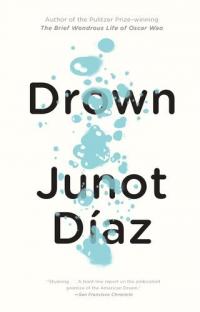Good Old Neon is my favorite thing written by David Foster Wallace.
'Good Old Neon' is an abnormal story. There is a narrator who talks a great deal about his life and the problem of feeling like a fraud. The bulk of this 41-page story is told in the first person. Essentially the narrator feels that his entire life has been nothing more than an attempt to fabricate an impression of himself for other people. I imagine that many intelligent people have experienced the same problem in their lives.
I would not call this story uplifting but there are several hilarious moments. One of my favorites is the narrator's laundry list of all the things he has tried to combat his problem:
"EST, riding a ten-speed to Nova Scotia and back, hypnosis, cocaine, sacro-cervical chiropractic, joining a charismatic church, jogging, pro bono work for the Ad Council, meditation classes, the Masons, analysis, the Landmark Forum, the Course in Miracles, a right-brain drawing workshop, celibacy, collecting and restoring vintage Corvettes, and trying to sleep with a different girl every night for two straight months."
I can't help but think that Wallace himself has tried many of these things himself. When you're depressed, it makes sense to try different activities to relieve your depression. I'm sure many of us can attest to trying a few of these activities. I've tried right-brain drawing, meditation and volunteering for a non-profit. Personally I've found meditation to be the most effective.
While re-reading Good Old Neon, I couldn't help but feel a bit disgusted at the narrator. He's not likable and its hard to read 41-pages that feel almost copied verbatim from his mind. It's a frustrating story to read because of its length and the reprehensible actions of the narrator. I was carried through by my interest in psychology since the narrator is prone to explaining things in a very no-nonsense manner.
One of the most bizarre aspects of this story involves the narrator and his relationship to a character named David Wallace. Without giving away anything, there is shift in perspective in the final few pages that caused me to reconsider the entire story in a new light. This shift is also what makes me wonder how much of 'Good Old Neon' is taken from Wallace's personal experiences.
I can't say that I recommend that you read 'Good old Neon' or any of the stories in Oblivion. I will say that this is one of the most thought-provoking things I have ever read. If there's one thing to applaud in Wallace's work, it's the innovative experimental nature of works such as this. The only thing I can think to compare with 'Good Old Neon' is Dostoevsky's 'Notes from the Underground.' These works share a troubled first-person narrator who feels alienated from society. In reading these stories, one feels uneasiness at seeing the thoughts of a disturbed person. It's like these thoughts were never meant to be revealed in the first place.
While I can't say that 'Good Old Neon' is enjoyable, I can say that it is a unique reading experience. The story displays Wallace's tremendous strengths as a writer, making it a good story for aspiring fiction writers to examine.
Buy Oblivion for yourself.
I would not call this story uplifting but there are several hilarious moments. One of my favorites is the narrator's laundry list of all the things he has tried to combat his problem:
"EST, riding a ten-speed to Nova Scotia and back, hypnosis, cocaine, sacro-cervical chiropractic, joining a charismatic church, jogging, pro bono work for the Ad Council, meditation classes, the Masons, analysis, the Landmark Forum, the Course in Miracles, a right-brain drawing workshop, celibacy, collecting and restoring vintage Corvettes, and trying to sleep with a different girl every night for two straight months."
I can't help but think that Wallace himself has tried many of these things himself. When you're depressed, it makes sense to try different activities to relieve your depression. I'm sure many of us can attest to trying a few of these activities. I've tried right-brain drawing, meditation and volunteering for a non-profit. Personally I've found meditation to be the most effective.
While re-reading Good Old Neon, I couldn't help but feel a bit disgusted at the narrator. He's not likable and its hard to read 41-pages that feel almost copied verbatim from his mind. It's a frustrating story to read because of its length and the reprehensible actions of the narrator. I was carried through by my interest in psychology since the narrator is prone to explaining things in a very no-nonsense manner.
One of the most bizarre aspects of this story involves the narrator and his relationship to a character named David Wallace. Without giving away anything, there is shift in perspective in the final few pages that caused me to reconsider the entire story in a new light. This shift is also what makes me wonder how much of 'Good Old Neon' is taken from Wallace's personal experiences.
I can't say that I recommend that you read 'Good old Neon' or any of the stories in Oblivion. I will say that this is one of the most thought-provoking things I have ever read. If there's one thing to applaud in Wallace's work, it's the innovative experimental nature of works such as this. The only thing I can think to compare with 'Good Old Neon' is Dostoevsky's 'Notes from the Underground.' These works share a troubled first-person narrator who feels alienated from society. In reading these stories, one feels uneasiness at seeing the thoughts of a disturbed person. It's like these thoughts were never meant to be revealed in the first place.
While I can't say that 'Good Old Neon' is enjoyable, I can say that it is a unique reading experience. The story displays Wallace's tremendous strengths as a writer, making it a good story for aspiring fiction writers to examine.
Buy Oblivion for yourself.







